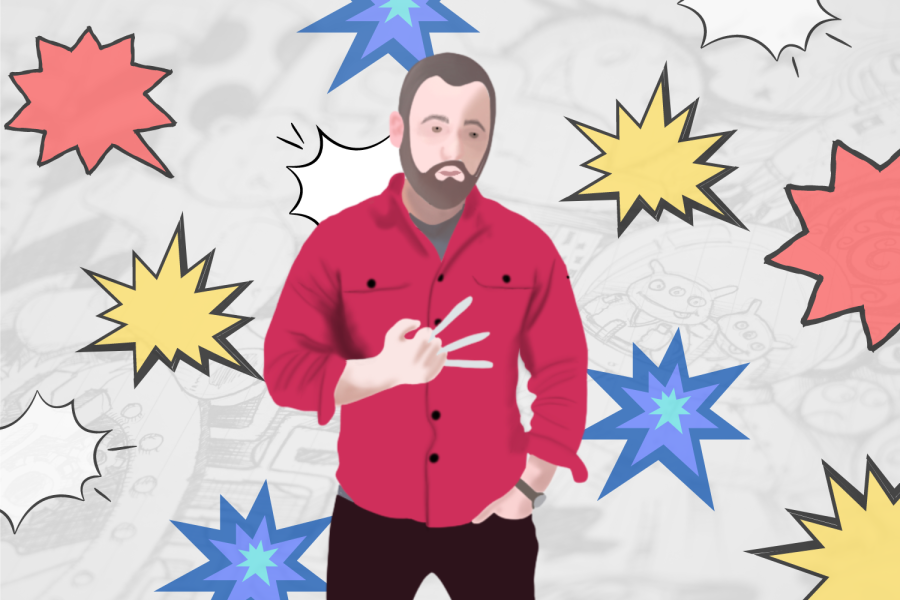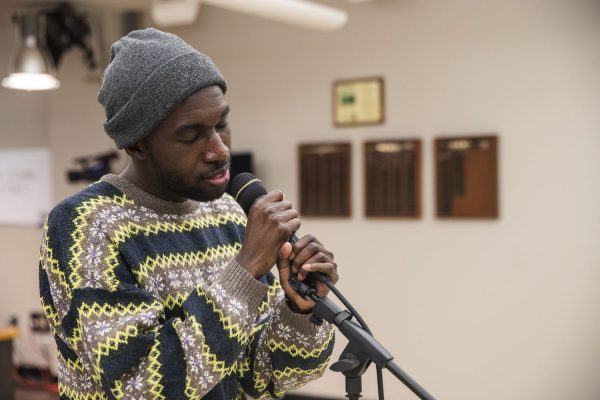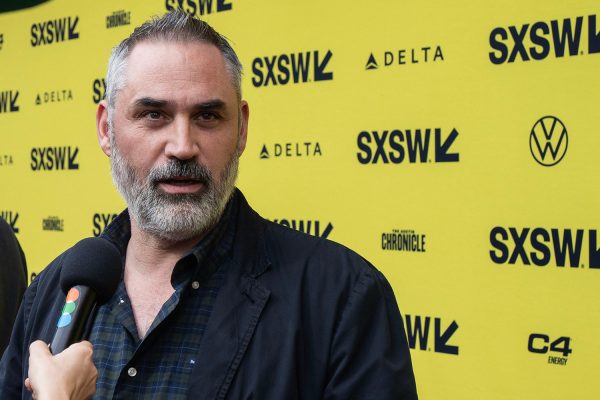Former UI visiting professor finds success in freelance writing
Writer Benjamin Percy’s prolific career spans from when he began as a journalist in college to getting a game-changing gig with Marvel comics. From there, he’s expanded onto novels and even movies.
May 3, 2022
Benjamin Percy, a guest professor at the University of Iowa in 2011, has written comics, articles, novellas, movies, novels, and even a writer’s craft book. He is most famous for his work with the Marvel comic book series, Wolverine, through which he transformed the character into a household name. Summering, a drama film about a group of girls and their final summer before middle school — which Percy wrote with the intent of providing a Goonies-like film for his daughter — came out earlier this year.
This transcript has been edited for clarity and concision.
DI: How do you manage your busy schedule considering you’re working on all these different projects? What is your secret to success?
Benjamin Percy: I am very good at compartmentalizing my days. I will plan in advance and my plan oftentimes has to do with what deadlines are chasing me. I’ll plan in advance to work out what I’m going to do tomorrow and tonight. I’ll say, “OK, from 7:30 until noon, I’m going to be deep into this novel. I’m going to take the dog for a walk and eat some lunch, and from 12:30 until 4 p.m., when the kids get home from school, I’m going to be working on this comic script.”

It doesn’t always work like that — it could be that I’ll spend four days just finding the flow of a novel, and then one day working on a movie script to another day working on an article. But usually having everything calendared in my mind allows me to prep for the work I need to do and plan accordingly, and sort of getting into the mindset hours or days before I’m actually going to hit the keyboard. It helps to prevent writer’s block, as well, and that if I ever get jammed up on something, which always happens if I’m stuck on the character, or working my way through a tough plot point. I can always walk away from that project and go work on one of the other projects that’s waiting on my desk, and then I can come back to the other thing later with a fresh perspective and renewed enthusiasm.
RELATED: Ask the Author: Jennifer Fawcett
DI: How do you think writing comics has influenced your style of novel writing?
Percy: Well, [its’] certainly made me more efficient as a novelist.
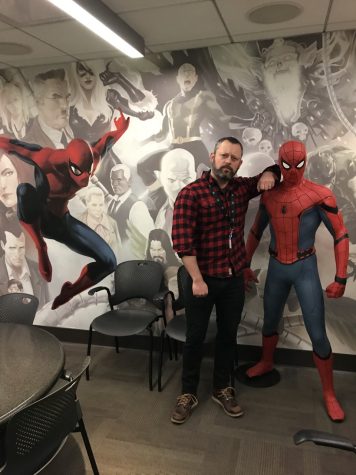
I mentioned before how comics are 20 pages with five to seven scenes. And you always know as a novelist that you’re supposed to be doing more than one thing at a time, you should be contributing to characterization and to plot and to theme ideally, at the same time, but you’ve got 300 pages or you got 400 pages and sometimes you can be a little indulgent as a result of that, but comics don’t allow that — you have to get things done, and get them [done] swiftly. So that’s why, for instance, if there’s a fight scene, the heroes and the villains are also talking the whole time, because we’re moving the plot forward, but we might also be contributing to the theme and characterization via the narration, or via the dialogue happening at that moment. So, they’ve made me more efficient. They’ve also clarified things for me. If you think about comics as being very bombastic, and sort of Technicolor, they make everything rise to the surface very obviously. And then you can take some of those elements and apply them more suddenly to other forms of writing. An example of this is, well, villains. If you look at the way villains operate in comics, they are always an externalization, have an internal wound, let’s say in the protagonist and the hero. So, let’s talk about this through the prism of the best rogues gallery there is, which is Batman’s. Batman’s core wound is when he was little, he went to the theater with his parents, and they took a shortcut home through the alley, and they were set upon by a robber, and the pearl necklace of Martha Wayne was torn from her neck. Thomas Wayne tried to intervene, gunshots fired, they died. Little Bruce Wayne is left sobbing in this rain-patterned alley, and in that moment, giving rise to the Batman, and Batman is trying to bring law and order to the chaos of Gotham City.
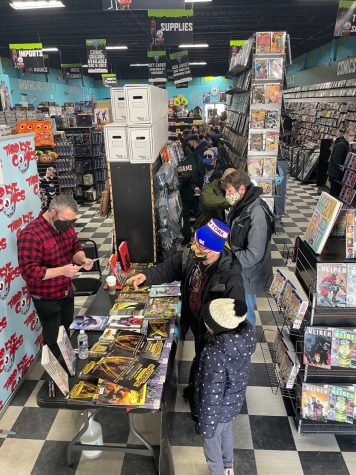
The chaos is epitomized in that moment in the alleyway. So, there’s the Joker, right, who captures that chaos better than anyone, but if you look at other characters that Batman might encounter, look at the way that they’re exploring other things going on inside of the same characters’ other faults. For instance, if you have a story about Dr. Freeze, it should be about Bruce Wayne’s emotional coldness. If you have a story about Two-Face, it should be about the question, “Is Bruce Wayne the man and Batman the mask, or is Batman Batman, and Bruce Wayne the mask?” If you’re writing a story about Scarecrow, it should be a story all about fear — the way that these characters, Batman and Scarecrow, are exercising that Batman is taking in the fear of his childhood, and he’s weaponizing it against others for the good of the city. Scarecrow also suffered as a child, his father was a mad scientist who experimented on him with fear serums, but Scarecrow as an adult is again weaponizing fear — but he’s doing it with ill intent as a kind of dark mirror of Bruce Wayne.
RELATED: Ask the Author: Nickolas Butler
DI: I’ve heard before that to make it in the creative-writing field, you have to be entrepreneurial. Would you say that’s true?
Percy: I’m constantly thinking about where I’m going to invest my time. In order to tell the most artistically sound stories, of course, but also to keep my career on an upward track. So, what I tend to do is have a combination of low-risk and high-risk projects going on. The same way, and I know that sounds a little bit crass, but sort of in the same way that you would consider an investment portfolio. So, I will have comics, for instance, which are very reliable for me. I know I have this many issues, and I’m contracted for a year and then they bring in a steady but rather small amount of money compared to higher risk projects, like a TV pitch, or a movie script that I’m actually writing.

The chances are much smaller than that movie pitch or that TV pitch will work out, but if they do, the money that I would make from that dwarfs the money that I would make for comics, and sort of, again, to compare it to an investment portfolio — you have your investments that are more conservative, and they’re just going to steadily grow. Then, you have, you know, the “stock market” which is much more volatile than mutual funds. You can have major gains there, or you can have major losses. I’m always trying to balance the two sort of in a safe, risky way. And a lot of things haven’t worked out, but several things have, and I’ve continued to steadily build a creative life for myself, that has also been thankfully lucrative.
DI: So, just comparing collaborative projects versus independent projects, what would you say the difference in both responsibilities and also how you approach them is?
Percy: Comics is a collaborative medium. I’m the writer, but there’s also an artist and there’s also a colorist and there’s also a letterer, and that letterer is taking the script and putting the sound effects in, and putting the words into the narrative captions and the dialogue balloons. So, it’s a team effort and, especially with the artist, I can develop a really tight relationship. We are sometimes texting or talking on the phone every day. We’re both strenuously trying to tell the best story possible, and that’s really exciting. It’s really energizing, but I’m glad that I also have the novel part of my life, which is much slower and more marathonic and hermetic, solitary pursuit, but I like that I have both in my life because they require me to use different parts of my brain, and they balance one another out. Too much time alone and in the dark isn’t good for anybody. So, when I’m working in comics, or when I’m working in TV or film, that exercise and collaboration can really open up a lot of doors in your mind that wouldn’t be available to you if you were going at it alone.



